- Home
- Joy Dettman
Goose Girl Page 5
Goose Girl Read online
Page 5
She had been thinking of hot metal, thinking of the burning car, when Ross came in. He picked up his mother’s old slippers, just left where she’d last kicked them off, and he held them to his chest and he wept for the first time. Finally his hands stopped shaking.
But, God, he was ashamed of his tears. ‘Stupid,’ he said. ‘I’m sorry. A man is a weak, blubbering fool. He’s making a complete fool of himself. I’m sorry, love.’
He’d never called her love, but his mother had. ‘Sally, love,’ she used to say.
‘You’re allowed to cry for her, Ross. I’d think you were a fool if you didn’t cry for her,’ Sally said, and she took the old slippers, tugged them from his hands, and placed them in a plastic bag. Then she put her arms around him, like Mrs Bertram would have if she’d been alive, and she held him close before the window, comforting him, and herself. She told him to look at the last sunset. Still holding each other and crying, they watched the sun all melt away until the bloody sky faded to purple. ‘Soon she’ll be a star in heaven,’ she said. ‘She’ll be up there with Daddy and the boys, and every night we can wave to her and blow her a kiss, Ross.’
The room became dark and somehow they were sitting on his mother’s bed, close to her, smelling her scent on the crocheted bedspread. Sally was still holding him, comforting him, giving something back, and he was holding on to her like he wasn’t ever going to let her go.
Then he kissed her. Kissed her mouth. And it got him all breathless, and he did it again, did it until it got like desperate kissing. He’d found something to turn off his brain and stop the hurt for a little while, and she wasn’t going to stop him. She didn’t want to stop him either, because it was washing some of the pain out of her heart.
They held each other tight, and then there was more than kissing. He was touching her breasts and it made her stop thinking of Daddy and death, and of how everyone around her seemed to die. She didn’t stop him when he put his hand under her blouse. There had been too much sadness today. She was all worn out and weary with sadness. This wasn’t sad.
His big hands started working at her blouse buttons and it took him ages, then ages more to undo her bra, and it was like he’d just opened up some precious gift that he was hardly brave enough to touch.
She knew what was going to happen unless she said no. But it was too late now to tell him no, and everyone of eighteen had had sex anyway. Better that it was Ross than one of the Sleiman grandsons, who slept with anything in skirts. Ross had never had a girlfriend in his life.
So she let it happen, and it was seriously uncomfortable but she didn’t feel bad about it. She’d comforted him and given him a gift – and little enough, too, after all he and Mrs Bertram had given to her.
‘Will you marry me?’ he said.
‘Jesus, Ross!’
Shouldn’t have said that. Shouldn’t have. Not today. But she wasn’t going to marry him. ‘You don’t have to marry me just because of . . . of that.’
‘What if you get pregnant?’ he said.
‘I’d have an abortion.’
‘You wouldn’t?’
‘I would so. I’m not marrying you. You’re my –’ Couldn’t say big brother. Wrong thing to say now. Her big brother had become her lover, sort of by default.
She didn’t pack her bags and run away. Mummy was in hospital, getting her share of attention and it would have been a good time to run. And she should have, before Ross got up the nerve to try it again. But he did, and they did it again, and it sort of got to be a habit in the month Mummy was in hospital.
Everything was okay for a while. She went to football functions in Melbourne, and sex was okay. Practice makes perfect, and Ross liked to practise. Maybe one day they’d get it right. She’d gone to worm-fingered, sleazy Sleiman to get the pill.
The winters were good; Ross spent his time driving backwards and forwards to football matches or training. The summers were not so good. They didn’t like the same things. She bought a tape of ‘Runaway Girl’ and every time she played it, he turned it down. She loved fiery hot pizza but he always ordered a ham and pineapple. They broke up once over pizza, and once over ‘Runaway Girl’, but she went back to him. He had no family, apart from a few cousins in Tasmania.
Then he did his knee at the beginning of the ’93 football season and he had to have an operation. She met another side of Ross. He was almost twenty-eight and his footy years were over. Sally was twenty-three.
‘Well, when are you going to be ready to get married? That’s what I want to know.’
‘I’m here, aren’t I? I’m cooking your dinner. I moved the sheep, didn’t I? What’s the difference, Ross?’
‘There’s a lot of difference. I want to have kids.’
‘Well, I don’t. I’ve got two big kids to look after already, and I sure as hell don’t want any more,’ she yelled at him that night, and she turned on ‘Runaway Girl’ and played it loud, made the old farmhouse walls vibrate with it. He hobbled out to the mains on the front verandah and pulled out the fuse. They’d argued on in the dark.
‘I want you here with me, Sally. It’s crazy. We’ve been together for six years and you’re still running home to her at night. Tell her that it’s your life.’
‘Is it? Is it my life, Ross? Why don’t the pair of you do a King Solomon on me? Cut me in half. You can have the legs and sex bits and Mummy can have the hands and the ears,’ she said.
And what is left for me? What is left for Sally De Rooze?
Nothing. A big fat nothing.
Most of their friends were getting married, a few had started their families. A year passed before he wore her down and they set the date, booked the church, booked a honeymoon in Bali. Just for seven days. They were going to pay Mrs Jenner to stay at the flat with Mummy until they got back. They’d fixed up a room at the farm so she could move in with them.
Then she did it again.
Sally was taking up the hem of a skirt when out of the blue Mummy picked up the scissors and stabbed herself in the breast. The blades were not long enough to do much damage, but the Sleaze found the lump while he was putting in a stitch.
So the wedding was off – which was a bit of a relief. Sally used her annual holidays that year travelling backwards and forwards to the city hospital. No more head-sick now for Mummy. This was full-on sick, with the Melbourne doctors finishing off the job she’d started. They cut her breast off.
Life in that housing ministry flat altered that year. For the first time since the car accident there was something resembling sanity at home. The mother Sally had known as an eight year old had come back. She cooked meals, swept floors, had food in the fridge.
And Sally knew why.
Mummy had got her bookings back.
All the dates were written down in her diary. All the phone numbers. Specialists bookings. Hospital bookings. Therapy bookings. She had long phone conversations with Mrs Smith and Mrs Hudson, who also had their bookings, the three women travelling to Melbourne together.
No more talk of Daddy and the boys now. Mummy talked cancer, spoke of the amount of people who lived on this side of town who had died of cancer, spoke of the other dead too, of Grandma and Aunty Bernice.
Grandma had booked herself into a Melbourne hotel one weekend then taken a dive off the roof because Papa had been playing around with the slut from his office. Sally had not known how Grandma died, just that she’d done it when Sally was three. And to put some icing on the cake, Mummy spoke of Aunty Bernice. She had died of cancer of the breast.
Little runaway girl
Keep on running till you get to the place where you want to be
Catch a moonbeam, or a star –
Get out the rubbish bin, here comes Sally De Rooze, born 1970 died 19–. Never saw anything, never did anything. Never will either. Born with faulty genes. Toss her on the mulch heap. Any place will do.
Catch a moonbeam, or a star. Hold it high and you’ll see far –
It will light your way o�
�er mountain and the sea.
‘I’m going to get a job in Melbourne, Ross.’
‘Don’t start that again, Sally!’
‘Oh, shit. Please listen to me, Ross. I don’t want to marry you.’
‘And I don’t want to listen to that rubbish again, and stop your swearing.’
‘Karen Matthews doesn’t say “shit”. She’s spent ten years of her life chasing after you, Ross, and she’s the right height. She’s got good genes. Her grandmother is ninety-five not out.’
Ross didn’t want Karen Matthews or her grandmother.
Little runaway girl. Keep on running till you get to the – to the – to the –
‘I’m jinxed, Ross. My grandma took a dive from a hotel roof when I was three. My aunty died of cancer when I was six. My father and little brothers died in a car crash when I was eight. Your mother died four years after I met her and Mummy is sick again. She thinks it’s gone to her liver. Just let me go. Please.’
‘They gave her the all-clear two years ago. There’s nothing wrong with your mother that a swift kick up the backside wouldn’t improve. So when are we getting married, for Christ’s sake?’
Little runaway girl. Keep on running –
‘Shit!’
Just – just keep on –
‘Shit!’
Just
Sally De Rooze
August 1999
Rain was belting down. Her windscreen wipers squealing for mercy, she almost missed her turn out of Toorak Road. As she swung a too-fast left, the rear of her car slewed, floated a while. She needed new tyres. Needed a lot of things, but didn’t need the rain even if Melbourne did.
She swung a left again into Bollinger Street, where the gutters ran deep and naked trees stood like a regiment of dark skeletons with wet feet. Her right blinker on, she gave way to a brown Ford exiting the narrow driveway, then she drove on down to the car park at the rear of the flats.
And his hulking great bike was parked in her bay again!
She paid for that space. She paid twenty-five dollars extra a month to have a roof over her car, not to keep a Harley dry. But its owner was a big black question mark and she was just a small, insignificant dot. She hadn’t fought hard for her under-cover park in the early months, preferring to park in one of the front bays. They were well lit by streetlight and closer to the flat entrance anyway, and May and June had been fine. Only since July had she been waging a paper war against that bikie, and tonight her little car wasn’t going to sit out in this downpour so his bike could stay dry.
She moved her car level with the window of Number 14, the heel of her hand leaning on her car horn.
Beep-be-be-beep. Bee-eep. A long overdue demand to be heard. Beep-be-be-beep. Beeeee-eeep. She leaned again, prepared to sit there with her hand on the horn until she was heard. Nobody ever listened to her. Ross didn’t. She could talk to him until she was blue in the face but none of it got through.
Then the slam of a door. The wet slap-scrunch of boots on concrete and a heavy hand probably added an extra dent to her rusting boot.
‘Back up,’ the bikie yelled. Maybe he’d read the multiple messages she’d been sticking on his bike’s precious paintwork with Blu-Tack.
She wasn’t going to back up for him or anyone else; never again. The car inched forward; its bumper nudging the concrete wall. She waited for the Harley to disappear into the rain, then her rust-bucket yellow Datsun 120Y claimed its space in the sardine can, between a white Camry and an old silver Commodore.
So dark once her headlights were off. No outside light, or none that worked. She glanced up at the building, an ugly concrete cube with a flat roof and three levels of long windows where only slim slits of light escaped from behind closed blinds. No welcoming light from her own window, either. Hers was a front flat, her main window looking down on Bollinger Street. She drew a deep breath, locked her car; then, her bag over her shoulder, a large plastic Myer bag in her hand and her umbrella snapped open, she stepped from beneath the meagre shelter into the deluge.
The flat entrance, a black hole in the side of the concrete block, was directly opposite a concrete wall of letterboxes. Tonight, soggy junk mail drooped from each gaping slot. She emptied Number 11’s box and, wet paper in hand, ran for the stairs and shelter.
Five bedsitters on each floor; five brown doors with brass numbers opened off a narrow passage. The building may have been new thirty-odd years ago, but now the doors needed a paint job and the brass needed a polish and the concrete stairs needed a scrubbing brush.
Dark as pitch on the second flight, that solid, black, lung-sucking dark, and the fluorescent tube on her landing, a stuttering, ghostly glow. Imagining the big bikie’s flick knife cold between her shoulder blades, she scanned behind her, keys held like a weapon in her hand.
Her phone was ringing. It rarely rang. Probably the guy from Blackburn with the office job and he’d hang up before she got in.
‘Damn the lock,’ she said; the key wriggled, withdrawn and inserted again as a door opened behind her. She spun around to face an attack from the rear but it was only the little girls from 13. She smiled at the dark-eyed duo.
‘Hello,’ they said before heading for the stairs, bundles of multicoloured tracksuits in their arms. Tiny kids, ten and twelve. They looked less; they looked Asian but spoke with Australian accents, and they had Australian names: Helen and Elizabeth.
How could a family of four survive in a bedsitter? They did; they had a sewing machine in there too. Sally could hear it now, that familiar zip zip zip – like Mrs Bertram’s sewing machine. She’d never sighted the person who sewed the tracksuits, but had met the little Asian guy and his girls carrying their bundles up the stairs or down to his white kombi van.
‘Bloody key!’ It helped sometimes to swear at it. She’d contacted the agent three times about her lock, her dripping tap and faulty lightfitting. He made a lot of promises but did nothing.
Then the key turned, and the phone was still ringing.
She hit the light switch and hallelujah, the globe didn’t blow. Her mail and plastic bag tossed on to the kitchen bench, she snatched up the phone. ‘Sally De Rooze speaking,’ she said, striving to sound tall, infinitely employable.
‘G’day, love. I’ve been trying to get onto you since six.’
‘Hi, Ross.’ Disappointment. ‘I worked late.’ She’d wanted the call to be from the guy with the job at Blackburn. ‘I gave you my work number.’
‘You wouldn’t have wanted to hear this at work. Your mum is back in hospital.’
‘I don’t want to hear it here either.’
‘I know. Sorry, love, but she was attacked by an intruder, or so she said.’
‘What?’ Her hand felt for cigarettes.
‘Mrs Jenner called me around five. I drove in and took her to the hospital. Apparently some bloke got in and –’
‘Is she hurt?’ She sucked on the cigarette. ‘Did he mark her?’
‘No. She looked fit enough. Just – you know, love.’
‘I know.’
Five minutes later she hung up the phone. She stood a moment, staring at her shoulder bag, then she placed it on top of the fridge, slipped her arms from her parka and shook it. It shed its own small rainstorm to the floor, arced its spray of raindrops over her bare beige wall – a spotty rainbow, but no pot of gold waited at the end. She shook the silky pink fabric again, overlaying the larger spots with a finer spray.
‘Temporary beautification for a very temporary life,’ she said. ‘Mummy has decided I’m going home.’
Parka hung behind the door, electric jug set to boil, coffee in her mug, she gave her attention to her mail. No reply from Raelene Mason. It was years since she’d written to her, and she hadn’t really expected a reply. Hoped for one, though. No job offer either. She wanted that job. It was in a little one-man office and the money wasn’t bad. He’d said he’d contact her.
A brief glance at the cover of a jewellery catalogue from Gemsgalore. Too we
t to open, it went straight in the bin. She opened a wet please-pay bill from her dentist. It would dry out by next week; she couldn’t give him anything this payday. A postcard of Sydney by night, addressed to Miss C Wong. She’d moved out of Number 11 in May and hadn’t bothered to leave a forwarding address, but the United Energy bill wore the right name. Too soggy to read, it fell apart in Sally’s hands.
‘They’ll send me another one.’
The rubbish bin got the lot, except for a plastic-coated cardboard pizza ad, the dentist’s bill and the postcard. She had never been to Sydney, and no-one ever sent her postcards, so she claimed this one, fixing it to her refrigerator with a smiling cat magnet.
Her small television was perched against the wall on a red plastic storage box. The power turned on, she stood flicking through the channels with the remote control until she found a nature show on Channel 2. It was fuzzy, buzzy, but experienced fingers twisted the rabbit-ear aerial until the picture became clear enough.
Bread in the toaster, coffee made, she took up the Myer bag and from it removed a long black overcoat.
‘I love it, I love it, I love it,’ she said, slipping it on as she stood before the television on which a giant redback spider and her anorexic mate performed their lover’s ritual. She hadn’t known about the redback’s bad habit of eating her mate. While the little male redbacks in Ross’s outdoor loo offered their sperm, the females were pumping in a food digester, readying lover for supper!
‘Cannibals come in many forms, Sall old gal,’ she said.
The toast popped and she walked to her cupboard, searching for a can of baked beans. She found peanut butter and a tiny tin of passionfruit pulp bought weeks back. It didn’t taste the same out of a can, but it filled an occasional need.

 The Hope Flower
The Hope Flower Trails in the Dust
Trails in the Dust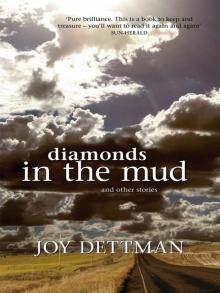 Diamonds in the Mud and Other Stories
Diamonds in the Mud and Other Stories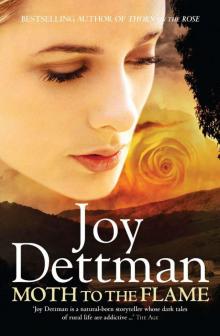 Moth to the Flame
Moth to the Flame The Tying of Threads
The Tying of Threads Wind in the Wires
Wind in the Wires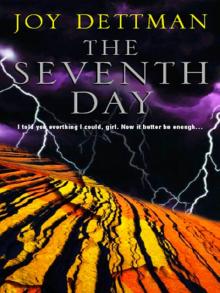 The Seventh Day
The Seventh Day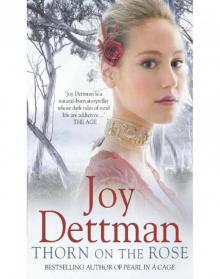 Thorn on the Rose
Thorn on the Rose Jacaranda Blue
Jacaranda Blue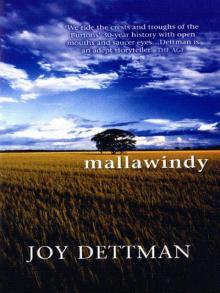 Mallawindy
Mallawindy Ripples on a Pond
Ripples on a Pond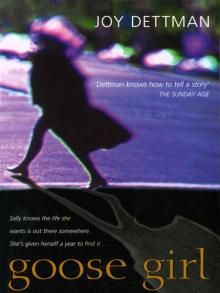 Goose Girl
Goose Girl The Silent Inheritance
The Silent Inheritance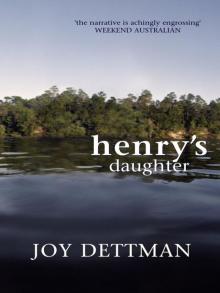 Henry’s Daughter
Henry’s Daughter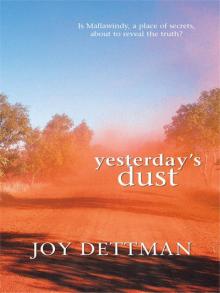 Yesterday's Dust
Yesterday's Dust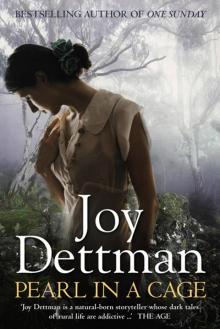 Pearl in a Cage
Pearl in a Cage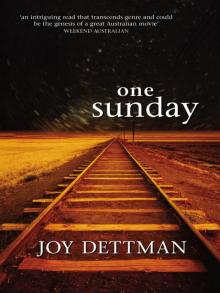 One Sunday
One Sunday